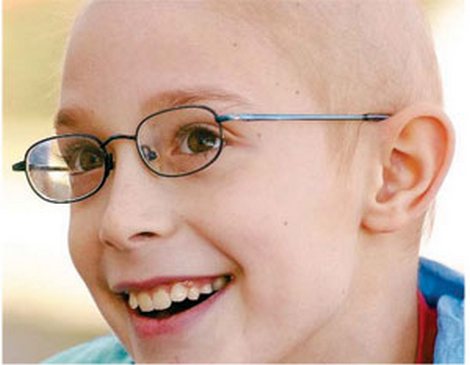Baldness in Children Due to Cancer Chemotherapy
Being diagnosed with cancer is a shocking news, and it is especially traumatic for sick children and their parents. Hair loss is often an inevitable consequence of such cancer treatments as chemotherapy and radiation, which affected kids have to undertake. While temporary baldness may not be a big issue for minor children, cancer-stricken teenagers can suffer deep emotional trauma related to both their disease and altered self-image. Finding a way to help the child cope with the pain of hair loss thus becomes a very serious concern for parents, caregivers, and doctors.
For teens going through a chemotherapy treatment, becoming bald can be a devastating event. This is why it is crucial for the parents to inform the child beforehand that hair loss is a common side effect of cancer therapies, so that he can be psychologically prepared for coming baldness. The parents should also let their kid know that chemotherapy-related hair loss is not permanent and that there are many practical solutions to solve the problem.
For a child, covering the head with a pretty head-scarf or wearing a well-fitted wig are the most effective options to avoid hair loss-related emotional trauma. Before chemotherapy, persuade your kid to have her hair cut short, so that expected hair loss does not appear too obvious after the treatment. When the hair starts shedding in large quantities, experiment with baseball caps (for boys), scarves (for girls), or differently-textured wigs. Teenage boys can often accept the option of completely shaving their heads, since shaved scalps contribute to the “macho image” which is fashionable is the teen subculture. In any case, remember that looking good and “fitting in” his social circle is very important for your cancer-affected kid.
Another good strategy is to get your child acquainted with other cancer survivals of his age. Their experience of chemotherapy, radiation, related hair loss, and applied solutions can be very supportive to keep your teen in good spirits as he is fighting cancer.
Since not all anti-cancer medications trigger either complete baldness or considerable hair shedding, it is advisable that you should ask your doctor in advance whether hair loss is likely to happen due to the treatment. However, most chemotherapy pills do cause baldness because they are designed to annihilate fast-growing cells. Cancer cells respond well to such treatment because they grow and reproduce rapidly, but hair follicles are also fast-growing cells and therefore they are expected to be destroyed by chemotherapy drugs, too.
The good news is that, in the majority of cancer patients of all age groups, hair starts re-growing approximately three-four months after the chemotherapy course is over. The newly-grown locks may initially be of a different colour and weaker texture than the original hair, but with time the hair regains its thickness and natural hue.
If the child has to undergo radiation treatment in the head area, the treated scalp zone is likely to go bald, too. Unlike with chemotherapy, radiation-induced baldness is often permanent and cannot be reversed.
Typically, scalp hair starts falling out about two week after the first chemotherapy session. The hair falls begins as minor shedding which gradually becomes more severe until almost all scalp hair is gone. In case of radiation treatment, bald patches may appear on the head only if radiation has been applied on the cranial area.
Christiana Roberts
Posted on September 4, 2008
Filed Under Hair Loss, Hair Loss Conditions
Comments
Leave a Reply

